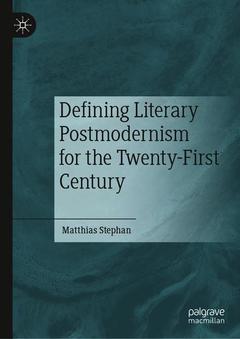Defining Literary Postmodernism for the Twenty-First Century, 1st ed. 2019
Auteur : Stephan Matthias

This book presents a definition of literary postmodernism, using detective and science fictions as a frame. Through an exploration of both prior theoretical approaches, and indicators through characteristics of postmodernist fiction, this book identifies a structural framework to both understand and apply the lessons of postmodernism for the next generation. Within a growing consensus that the postmodern era has passed, this book examines the different conceptions of postmodernism and posits a meaningful definition, one which can provide the foundation for future literary expression. This theory is then applied to genre fiction, particularly detective fiction and science fiction, demonstrating that postmodernism is found in the structure, rather than questions posed about literary expression. Finally, Matthias Stephan considers post-postmodern movements, and how they can be expressed given this definition of literary postmodernism, moving forward to the twenty-first century.
I. Introduction
a. Literary Postmodernism
b. The Structure of Defining Literary Postmodernism for the Twenty-First Century
Part 1: Defining Postmodernism
II. What do the theorists say (and how do they fit)?
a. Lyotard and The Postmodern Condition
b. Strong Postmodernism and Political Efficacy
c. Linda Hutcheon and Historiographic Metafiction
III. Characteristically Postmodern
a. Metafiction
b. ‘All the world’s a stage’ – Parody, Play and Intertextuality
c. Isn’t it Ironic? – Postmodern Ironyd. The Dominant of Postmodernist Fiction
IV. Mapping the Space of Postmodernism
a. The Call for the Spatial Metaphor
b. Postmodern Space, or the Cognitive Mapping of Late Capitalismc. The Name of the Map: The Skein, The Maze, and The Net
d. Rhizome – The Postmodern Metaphore. Mapping (hyper)reality: The Orders of Simulacra
f. A ‘structure of consciousness’
g. The Postmodern Structure of Consciousness
Part 2: Postmodernism in Praxis
V. Whodunit? And how do we know? (or do we?): The Structure of the Epistemological Investigation in Detective Fictiona. What is detective fiction?
b. The Classical Model: Logic and Deductionc. The Modernist Model: Legwork and Induction
d. The Postmodern Detective Novel: Can we know whodunit?
e. The Late Modernist Detective Fiction: Modernist with a Twist
f. Conclusion
VI. What world is this? Who am I (in it?)?: The Structure of the Ontological Formation in Science Fiction
a. The History of Science Fiction
b. Ontological Certainty or Predestination: The Classical Approach
c. Ontological Uncertainty: The Modernist Approach - Dialectics
d. Who Am I? – (Moving Towards) the Posthuman Scenarioe. Ontological Indeterminability: The Postmodernist Approach
f. Conclusion, or What does SF tell us about Postmodernism?
VII. The Postmodern Novel: How it all comes together, in a rhizomatic way
a. Svend Åge Madsen – Tugt og utugt i mellemtiden
b. Whodunit? And how do we know?
c. “Back then I thought we shouldn’t punish one another.” (Madsen 1992, 266)
d. Who am I? - It is all so subjective
e. Who is telling this story anyway? – Narratological levels and ontological uncertaintyf. The Postmodern Novel – Madsen style
VIII. Coda: What comes next? (Or what to do with a problem called Postmodernism?)
a. Where do we go from here? The Possibility of the Postpostmodern
b. Pro-Post-Postmodernism – Or how one argues for postmodernism’s afterlifec. Neo-Victorianism
d. The ‘Outs’ of Postmodernism
Matthias Stephan is Lecturer at Aarhus University, Denmark. He researches primarily on postmodernism, and its implications in the Gothic, science fiction, and crime fiction. He is general editor for Otherness: Essays and Studies, and coordinator of the Centre for Studies in Otherness.
Contributes to the understanding and categorization of literary movements
Argues for a rethinking of the definition of postmodernism
Illustrates key aspects of postmodernism via genre fiction
Date de parution : 05-2019
Ouvrage de 206 p.
14.8x21 cm
Disponible chez l'éditeur (délai d'approvisionnement : 15 jours).
Prix indicatif 79,11 €
Ajouter au panier


